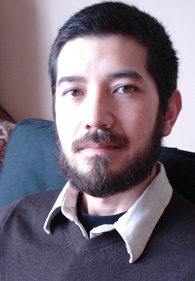RYO YAMAGUCHI |
|||
| return to contents | |
|||
All the News in a Given Length It was the holidays, three dogs in the pantry expecting, a shadow along was you I wished I closed in on, between your fingers. You were happy hour, 1995, the tallest building in the world I was many things, but not all at once. Sometimes a train ride and sometimes These are the ways we grow old. How steeply I've shot the tops of the trees this keep-it-in-the-cup, Autumn, they say, is like a song about autumn, the passwords. I think this story we fancy as ours is independent of us, You might think this, too—I'm not sure, I've not one must have thought, sitting at its edges, that it was everyone's, You must be a curve now I have those things, too, and I have the fence posts repeating through me the sun.
Master of Ceremonies The refusal was an intention the way intention has a long body. I was a toothache making vaults of every room; I was columns defining the essays; and though I backed my way clean through the heat, I still emerged as a blankness, when one has finally let go of action. O a pressure on the windows O the missive obscured. on one's body, the streets as they get
The Painting of your Face Have I told you I'd like to see you when you are done? a dime for your machine. What is the piano if not a cut open playing without us. I'd like to hold you against a view of planes So go the long, thin winds through their pedantry, all the details I'd like very much to kiss you, if you were the sort of thing and bright.
First We Are Born, Then We Watch Ourselves You say you are watching all of this, splashed in; you brush the extra molecules from your sweater and look back up it gleams. I remember when our satisfaction touched down clicked out of place, drifted, just so, to the left, I could call but you would see it coming. Every morning I wake in the same position. Every morning I say, take a risk, a man. I lift the sheet above my head and watch it float down. I cut myself from the house, go out there, where the living is, where I move
Eclogue, Fuss, Sweep The climbing was a wall, too, though here we were in between— post-receipt, dimmed by light itself and the announced made done. One takes one's finger Like this we will be in unison. Afterward only a figure, and farther the silky edge of the city's river She paused in her exhalation. There was nothing. One that dives like a gull or is a terror to the body interrupted. She thinks she will bear the stage through her mind like a dream laid down beneath the pressure of space. Elsewhere, all of it happening again. She lights the idea the past looks up from its small depression.
To Entertain Almost anything—from the middle French, to hold together from among; It teaches me to lie. If to fit myself to a window seat, off and away through the heavy azaleas—wherever it must be, I too. on my finger in the child's room. The child is awake and in and out O the largess, o how we say inconceivable, and how we say here, And the child is yet still lit with a half-real light, inchoate, with his about rivers and cats, paeans in the low forests, with what comes like snow to lay quiet, to gather into the child all that he spread out across the floor, continuous thought, like the bed as it drifts through the room
|
|||
